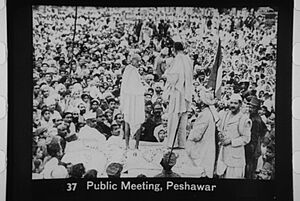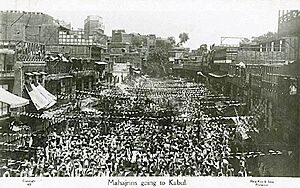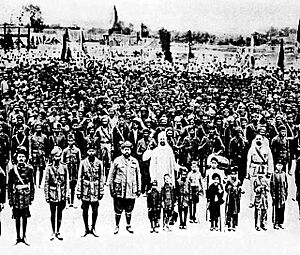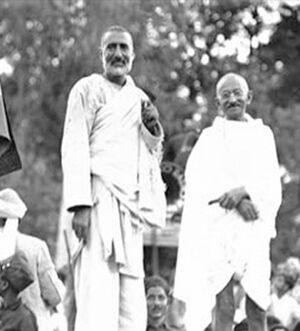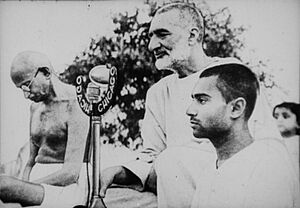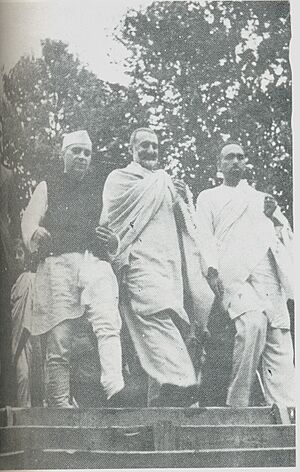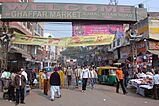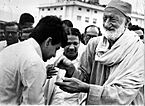Abdul Ghaffar Khan facts for kids
Quick facts for kids
Fakhr-e-Afghan
Sarhadi Gandhi Khan Abdul Ghaffar Khan
|
|
|---|---|
| عبدالغفار خان | |
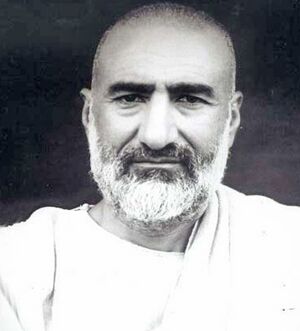
Ghaffar Khan c. 1940s
|
|
| Born | 6 February 1890 Utmanzai, Punjab Province, British India (present-day Khyber Pakhtunkhwa, Pakistan)
|
| Died | 20 January 1988 (aged 97) Peshawar, North-West Frontier Province, Pakistan
|
| Resting place | Jalalabad, Afghanistan |
| Nationality |
|
| Education | Aligarh Muslim University |
| Title | Bacha Khan/Badshah Khan |
| Political party |
|
| Movement | Indian independence movement
|
| Spouse(s) |
Meharqanda Kinankhel
(m. 1912–1918)Nambata Kinankhel
(m. 1920–1926) |
| Children |
|
| Parent(s) | Abdul Bahram Khan (father) |
| Relatives | Abdul Jabbar Khan |
| Awards |
|
Abdul Ghaffar Khan (born February 6, 1890 – died January 20, 1988) was an important leader from the Pashtun people. He is also known as Bacha Khan or Badshah Khan, which means "King of Chiefs." He started the Khudai Khidmatgar (Servants of God) movement. This group worked against British rule in India using peaceful methods.
Ghaffar Khan was a political and spiritual leader who believed strongly in non-violence. He was a devout Muslim who also supported unity between Hindus and Muslims. Because his ideas were very similar to Mahatma Gandhi's, and they were close friends, people called him Sarhadi Gandhi, meaning "the Frontier Gandhi."
In 1929, Khan started the Khudai Khidmatgar movement. This movement used non-violent ways to resist colonial rule. The British government tried to stop Khan and his followers many times. The Khudai Khidmatgar faced some of the toughest challenges during the entire Indian independence movement.
Khan was strongly against the idea of dividing India into two separate countries: Pakistan (for Muslims) and India (for Hindus). He supported the Indian National Congress party, which wanted a united India. When the Congress party agreed to the partition plan without asking the Khudai Khidmatgar leaders, Khan felt very let down. He famously told them, "you have thrown us to the wolves."
In June 1947, Khan and other Khudai Khidmatgar leaders asked the British to let the Pashtun people have their own independent state called Pashtunistan. This state would include all Pashtun areas of British India. However, the British government said no to this request.
Because of this, Khan and his older brother, Khan Abdul Jabbar Khan, boycotted the 1947 vote in their province. This vote was to decide if the province should join India or Pakistan. They felt it was unfair because it didn't offer the option for the Pashtun-majority province to become independent or join Afghanistan.
After India was divided, Khan promised to support the new country of Pakistan. He stayed in the area that became Pakistan's North-West Frontier Province. However, the Pakistani government often arrested him between 1948 and 1954. He was also arrested in 1956 for opposing a plan to merge all provinces of West Pakistan into one unit. Khan spent many years in jail or living away from his home in the 1960s and 1970s.
In 1987, the Indian government gave him the Bharat Ratna, which is India's highest award for civilians. When he passed away in Peshawar in 1988, he was buried at his home in Jalalabad, Afghanistan, as he wished. Tens of thousands of people attended his funeral. This included the Afghan President Mohammad Najibullah. Even though there was heavy fighting during the Soviet–Afghan War at that time, both sides agreed to stop fighting so Khan's burial could happen peacefully.
Contents
Early Life and Education
Abdul Ghaffar Khan was born on February 6, 1890. His family was a well-off Pashtun family in a village called Utmanzai, in what was then British India. His father, Khan Abdul Bahram Khan, owned land.
Khan went to the Edward's Mission School, which was run by Christian missionaries. It was the only good school in the area. At school, Khan did very well. His teacher, Reverend Wigram, inspired him to see how important education was for helping his community.
After finishing school, he was offered a high-ranking position in the British Indian Army. But Khan turned it down. He felt that even Indian officers were treated as second-class citizens in their own country. He had wanted to go to university in London, England, like his brother. His father eventually agreed, but his mother didn't want another son to leave. So, Khan started working on his family's land while deciding what to do next.
Starting Schools and Movements
When he was 20, in 1910, Khan opened a school in his hometown of Utmanzai. In 1911, he joined the independence movement led by Pashtun activist Haji Sahib of Turangzai. By 1915, the British authorities closed Khan's school. They saw his support for Indian independence as a threat.
Khan saw that many past revolts against British rule had failed. He decided that working for social change and reform would be better for the Pashtun people. This led him to form the Anjuman-e Islāh-e Afghānia (Afghan Reform Society) in 1921. He also started a youth movement called Pax̌tūn Jirga (Pashtun Assembly) in 1927.
After returning from a religious trip to Mecca in 1928, he started a Pashto-language political newspaper called Pax̌tūn. Finally, in November 1929, Khan founded the Khudai Khidmatgar (Servants of God) movement. This movement strongly pushed for an end to British rule and for a united, independent India.
Ghaffar "Badshah" Khan's Work
Because he couldn't continue his own higher education, Bacha Khan decided to help others get an education. The North-West Frontier Province (now Khyber Pakhtunkhwa, Pakistan) was very important to the British. It acted as a buffer against Russian influence. But this didn't help the local people much.
Bacha Khan saw the need to help his fellow Pashtuns. He wanted to improve their lives through education. He also wanted to challenge British rule, the power of some religious leaders, and the old traditions of violence. At age 20, he opened his first school in Utmanzai. It was very successful. Soon, he was invited to join other reformers.
Bacha Khan worked very hard to organize and inspire his Pashtun community. Between 1915 and 1918, he visited 500 villages. During this busy time, he became known as Badshah (Bacha) Khan, meaning "King of Chiefs."
He believed in unity and did not support religious divisions. Bacha Khan married his first wife, Meharqanda, in 1912. They had two sons, Abdul Ghani Khan (who became a famous artist and poet) and Abdul Wali Khan, and a daughter, Sardaro. Sadly, Meharqanda died in 1918 during a flu outbreak. In 1920, Bacha Khan married again to Nambata. They had a daughter, Mehar Taj, and a son, Abdul Ali Khan. Nambata also passed away early in 1926 after an accident.
The Khudai Khidmatgar Movement
Bacha Khan's main goal became to create a united, independent, and secular India. To do this, he founded the Khudai Khidmatgar (Servants of God) movement in the 1920s. This group was also known as the "Red Shirts."
The Khudai Khidmatgar believed in the power of Gandhi's idea of Satyagraha. This means using active non-violence. Bacha Khan told his members:
I am going to give you such a weapon that the police and the army will not be able to stand against it. It is the weapon of the Prophet, but you are not aware of it. That weapon is patience and righteousness. No power on earth can stand against it.
The organization grew to over 100,000 members. They became very important in the independence movement. They used strikes, political organizing, and non-violent protests to resist the British government. The Khudai Khidmatgar had some success and became very influential in the politics of their region. Bacha Khan's brother, Dr. Khan Abdul Jabbar Khan, led the political side of the movement. He even became the Chief Minister of the province.
Kissa Khwani Massacre
On April 23, 1930, Bacha Khan was arrested during protests. A large crowd of Khudai Khidmatgar gathered in Peshawar's Kissa Khwani (Storytellers) Bazaar. The British government ordered soldiers to fire machine guns on the unarmed crowd. About 200 to 250 people were killed.
The Khudai Khidmatgar members followed their training in non-violence. They faced the bullets without fighting back. Two groups of soldiers from the Garhwal Rifles regiment refused to fire on the peaceful crowd. They were later punished for this.
Bacha Khan and Indian National Congress
Bacha Khan and Mahatma Gandhi became very close friends. They had a deep respect for each other and worked together until 1947. Gandhi was the first to use non-violent mass protests in India.
The Khudai Khidmatgar worked closely with the Indian National Congress (INC). This was the main national organization fighting for independence. Bacha Khan was a senior and respected member of the Congress. When the Congress party sometimes disagreed with Gandhi, Bacha Khan always supported Gandhi. In 1931, the Congress offered him the position of party president. But he refused, saying, "I am a simple soldier and Khudai Khidmatgar, and I only want to serve."
He was a strong supporter of women's rights and non-violence. He became a hero in a society that often used violence. Despite his modern views, his strong faith and courage earned him great respect. He never lost faith in his non-violent methods. He believed that Islam and non-violence could go together. He saw his struggle as a jihad where only the enemy carried swords. Because of his non-violence, he was known as the 'Frontier Gandhi'.
O Pathans! Your house has fallen into ruin. Arise and rebuild it, and remember to what race you belong.
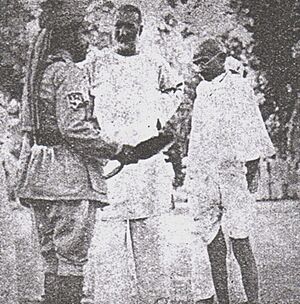
The Partition of India
Khan strongly opposed the partition of India. Some politicians accused him of being against Muslims. In 1946, he was physically attacked and had to go to the hospital.
On June 21, 1947, just seven weeks before the partition, a large meeting was held in Bannu. Bacha Khan, the Khudai Khidmatgars, and other leaders attended. They declared the Bannu Resolution. This resolution demanded that Pashtuns should have the choice to create an independent state called Pashtunistan. They did not want to be forced to join either India or Pakistan. However, the British government refused this demand.
The Congress Party did not accept last-minute plans to prevent the partition. This included Gandhi's idea to offer the Prime Minister position to Jinnah.
When the vote was held in July 1947 to decide if the North-West Frontier Province should join Pakistan, Bacha Khan, the Khudai Khidmatgars, and the Indian National Congress boycotted it. This means they refused to participate.
Arrests and Exile
Bacha Khan promised his loyalty to the new nation of Pakistan on February 23, 1948. He tried to make peace with Pakistan's founder, Muhammad Ali Jinnah. They had a successful meeting in Karachi. However, a second meeting never happened. It is believed that the Chief Minister of the province warned Jinnah that Bacha Khan was planning to harm him.
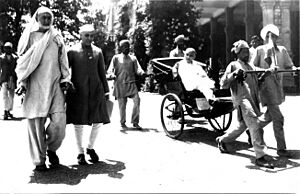
After this, Bacha Khan formed Pakistan's first national opposition party, the Pakistan Azad Party, on May 8, 1948. This party promised to be a constructive opposition and to be fair to all groups.
However, doubts about his loyalty continued. The new Pakistani government put Bacha Khan under house arrest without charges from 1948 to 1954. In 1954, he disagreed with his elder brother, Dr Khan Sahib, who joined the government. After being released from prison, Khan spoke out against the killing of his supporters in the Babrra massacre.
I had to go to prison many a time in the days of the Britishers. Although we were at loggerheads with them, yet their treatment was to some extent tolerant and polite. But the treatment which was meted out to me in this Islamic state of ours was such that I would not even like to mention it to you.
He was arrested many times after 1948. In 1956, he was arrested for opposing a plan to merge all provinces into one. He remained in prison until 1957 and was arrested again in 1958. He was finally released in 1964 due to illness.
In 1962, Amnesty International named Bacha Khan a "Prisoner of the Year." Their statement said his example showed the suffering of many people around the world who are imprisoned for their beliefs.
In September 1964, Pakistani authorities allowed him to go to the United Kingdom for medical treatment. He later went to Afghanistan and lived there in exile. He returned to Pakistan in December 1972. He was arrested again in November 1973 by Prime Minister Zulfiqar Ali Bhutto's government.
In 1984, he was nominated for the Nobel Peace Prize. He visited India in 1985 and received the Jawaharlal Nehru Award for International Understanding in 1967. He later received the Bharat Ratna, India's highest civilian award, in 1987.
His last major political stand was against the Kalabagh dam project. He feared it would harm the Peshawar valley. His opposition eventually led to the project being stopped after his death.
Death and Legacy
Bacha Khan passed away in Peshawar in 1988 due to complications from a stroke. He was buried at his home in Jalalabad, Afghanistan, as he had wished. Over 200,000 people attended his funeral, including the Afghan president Mohammad Najibullah. The then Indian Prime Minister Rajiv Gandhi also traveled to Peshawar to pay his respects. The Indian government declared five days of mourning for him.
Even though he had been imprisoned and treated harshly many times, tens of thousands of people came to his funeral. It was described as "a caravan of peace, carrying a message of love." This march from Peshawar to Jalalabad, through the historic Khyber Pass, was planned by Bacha Khan himself. It showed his dream of Pashtun unity. A ceasefire was announced in the Soviet–Afghan War to allow the funeral to take place. However, it was sadly marked by bomb explosions that killed fifteen people.
Pashtunistan Idea
Abdul Ghaffar Khan pledged his loyalty to Pakistan in 1948. When asked about "Pashtunistan" by Pakistan's Prime Minister, he said it was just a name for the Pashtun province within Pakistan, like other provinces. However, this seemed different from what he wanted before partition: an independent Pashtunistan.
Later, in a 1980 interview, Abdul Ghaffar Khan said that the "idea of Pashtunistan never helped Pashtuns." He felt that the idea was never truly possible. He also said that "successive Afghan governments have used the idea for their own political goals." He believed that "Pashtun people greatly suffered because of all this." He gave this interview while living in Jalalabad, Afghanistan. He also said, "I'll live here. I'm now (for all intents and purposes) an Afghan. I'm not even permitting my son, Khan Abdul Wali Khan, political leader of Pakistan's North West Frontier Province, to visit me because he'll insist that I go with him to Pakistan. But I don't want to go."
Family Members
Bacha Khan's eldest son, Ghani Khan, was a poet. His second son, Abdul Wali Khan, founded and led the Awami National Party. He was also the Leader of the Opposition in Pakistan's National Assembly.
His third son, Abdul Ali Khan, was not involved in politics. He was a respected educator and served as Vice-Chancellor of the University of Peshawar.
Asfandyar Wali Khan is Abdul Ghaffar Khan's grandson and is also a leader of the Awami National Party.
Recognition and Influence
Bacha Khan is widely respected among Pashtuns and in modern India for leading a non-violent movement. In Pakistan, however, some people have questioned his decision to side with the Indian National Congress instead of the Muslim League, and his opposition to the partition of India.
In 2008, a documentary called The Frontier Gandhi: Badshah Khan, a Torch for Peace was released. It won an award for Best Documentary Film. In the 1982 movie Gandhi, Bacha Khan was played by Dilsher Singh.
Many places are named after him. The Bacha Khan International Airport in Peshawar is named in his honor. So is the Bacha Khan University in his hometown of Charsadda.
Bacha Khan was included in a children's book as one of 26 men who changed the world. He also wrote his own life story. His ideas about peaceful Islam were recognized by US Secretary of State Hillary Clinton.
In India, the popular Khan Market in Delhi is named after him, as is Ghaffar Market in New Delhi. In Mumbai, a road along the sea is named Khan Abdul Ghaffar Khan Road.
See Also
- Mirzali Khan
- Khudai Khidmatgar
- List of peace activists
Images for kids
-
Khan with Mahatma Gandhi (c. 1940)
 | William Lucy |
 | Charles Hayes |
 | Cleveland Robinson |


